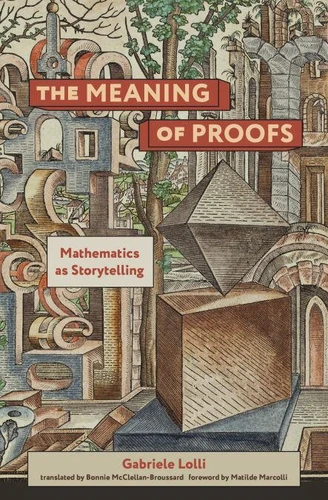The Meaning of Proofs. Mathematics as Storytelling
Par : , ,Formats :
Disponible dans votre compte client Decitre ou Furet du Nord dès validation de votre commande. Le format ePub protégé est :
- Compatible avec une lecture sur My Vivlio (smartphone, tablette, ordinateur)
- Compatible avec une lecture sur liseuses Vivlio
- Pour les liseuses autres que Vivlio, vous devez utiliser le logiciel Adobe Digital Edition. Non compatible avec la lecture sur les liseuses Kindle, Remarkable et Sony
- Non compatible avec un achat hors France métropolitaine
 , qui est-ce ?
, qui est-ce ?Notre partenaire de plateforme de lecture numérique où vous retrouverez l'ensemble de vos ebooks gratuitement
Pour en savoir plus sur nos ebooks, consultez notre aide en ligne ici
- Nombre de pages176
- FormatePub
- ISBN978-0-262-37104-9
- EAN9780262371049
- Date de parution27/09/2022
- Protection num.Adobe DRM
- Taille3 Mo
- Infos supplémentairesepub
- ÉditeurThe MIT Press
Résumé
Why mathematics is not merely formulaic: an argument that to write a mathematical proof is tantamount to inventing a story. In The Meaning of Proofs, mathematician Gabriele Lolli argues that to write a mathematical proof is tantamount to inventing a story. Lolli offers not instructions for how to write mathematical proofs, but a philosophical and poetic reflection on mathematical proofs as narrative.
Mathematics, imprisoned within its symbols and images, Lolli writes, says nothing if its meaning is not narrated in a story. The minute mathematicians open their mouths to explain something-the meaning of x, how to find y-they are framing a narrative. Every proof is the story of an adventure, writes Lolli, a journey into an unknown land to open a new, connected route; once the road is open, we correct it, expand it.
Just as fairy tales offer a narrative structure in which new characters can be inserted into recurring forms of the genre in original ways, in mathematics, each new abstract concept is the protagonist of a different theory supported by the general techniques of mathematical reasoning. In ancient Greece, there was more than an analogy between literature and mathematics, there was direct influence. Euclid's proofs have roots in poetry and rhetoric.
Mathematics, Lolli asserts, is not the mere manipulation of formulas.
Mathematics, imprisoned within its symbols and images, Lolli writes, says nothing if its meaning is not narrated in a story. The minute mathematicians open their mouths to explain something-the meaning of x, how to find y-they are framing a narrative. Every proof is the story of an adventure, writes Lolli, a journey into an unknown land to open a new, connected route; once the road is open, we correct it, expand it.
Just as fairy tales offer a narrative structure in which new characters can be inserted into recurring forms of the genre in original ways, in mathematics, each new abstract concept is the protagonist of a different theory supported by the general techniques of mathematical reasoning. In ancient Greece, there was more than an analogy between literature and mathematics, there was direct influence. Euclid's proofs have roots in poetry and rhetoric.
Mathematics, Lolli asserts, is not the mere manipulation of formulas.
Why mathematics is not merely formulaic: an argument that to write a mathematical proof is tantamount to inventing a story. In The Meaning of Proofs, mathematician Gabriele Lolli argues that to write a mathematical proof is tantamount to inventing a story. Lolli offers not instructions for how to write mathematical proofs, but a philosophical and poetic reflection on mathematical proofs as narrative.
Mathematics, imprisoned within its symbols and images, Lolli writes, says nothing if its meaning is not narrated in a story. The minute mathematicians open their mouths to explain something-the meaning of x, how to find y-they are framing a narrative. Every proof is the story of an adventure, writes Lolli, a journey into an unknown land to open a new, connected route; once the road is open, we correct it, expand it.
Just as fairy tales offer a narrative structure in which new characters can be inserted into recurring forms of the genre in original ways, in mathematics, each new abstract concept is the protagonist of a different theory supported by the general techniques of mathematical reasoning. In ancient Greece, there was more than an analogy between literature and mathematics, there was direct influence. Euclid's proofs have roots in poetry and rhetoric.
Mathematics, Lolli asserts, is not the mere manipulation of formulas.
Mathematics, imprisoned within its symbols and images, Lolli writes, says nothing if its meaning is not narrated in a story. The minute mathematicians open their mouths to explain something-the meaning of x, how to find y-they are framing a narrative. Every proof is the story of an adventure, writes Lolli, a journey into an unknown land to open a new, connected route; once the road is open, we correct it, expand it.
Just as fairy tales offer a narrative structure in which new characters can be inserted into recurring forms of the genre in original ways, in mathematics, each new abstract concept is the protagonist of a different theory supported by the general techniques of mathematical reasoning. In ancient Greece, there was more than an analogy between literature and mathematics, there was direct influence. Euclid's proofs have roots in poetry and rhetoric.
Mathematics, Lolli asserts, is not the mere manipulation of formulas.



